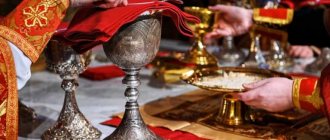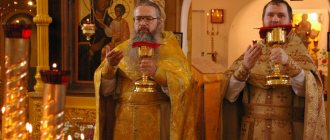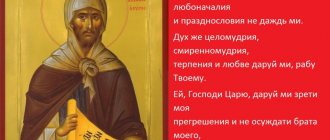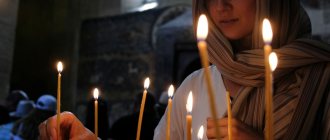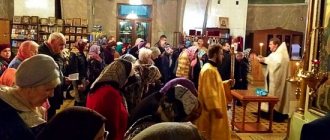Communion is considered the process of union with the Lord. After all, it is through the sacrament that divine grace is embodied in our body. When people receive communion, not only the soul is imbued with strength, but also the body. To carry out communion, it is necessary to carry out a number of conventions, and the most important thing in preparing for the process is to cleanse yourself and read prayers before communion.
You should definitely prepare for both confession and communion. Prayers before communion are an important event. Every word of the prayer book must be passed through your heart. You need to think about them. Cleansing the soul and body implies forgiveness of absolutely all offenders and enemies. Most often, the sacrament of communion is performed in the morning from seven to ten o'clock in the morning.
Preparation for communion consists of physical, spiritual and prayerful preparation:
A brief scheme of preparation: fasting for three to seven days - the night before, attending a service in a church - a house of prayer - in the morning for confession - and at the end of the service, receiving communion.
Fast from 3 to 7 days (judge by your condition: someone can only do three days, and someone can do all seven). Usually those who rarely receive communion and skip fasts fast for 7 days. Those who take communion regularly fast for 3 days. Fasting means physical and spiritual fasting. This means: do not eat food of animal origin, do not participate in drinking and celebrations, spend your days more calmly, without fuss, take water more often, do not have relationships with your husband or wife, do not smoke, think more about sins and God. At the moment of communion, be in feminine purity.
How to pray correctly before Communion, so that this is a real preparation for the sacrament?
Estimated reading time: 8 minutes.
Priest Alexey UMINSKY
Usually in our minds, preparation for Communion of the Holy Mysteries of Christ is necessarily combined with reading the rules for Holy Communion. This is, of course, correct. The following, including canons and prayers, exists precisely to prayerfully prepare a person for Communion. But what if, as Father Alexander Schmemann writes in his article “On the Meaning of Preparation for Communion,” “ideally, the whole life of a Christian is and should be a preparation for Communion - just as it is and should be the spiritual fruit of Communion”? This same thought, a little differently, was very clearly expressed by the holy righteous John of Kronstadt in his book “My Life in Christ”: he writes that if a person is not ready to receive communion every day, then he can never be ready for Communion.
In principle, the whole life of a Christian is such that he must be ready every day for Communion of the Holy Mysteries of Christ. Do not read the rule for Holy Communion every day, no, we are talking about the inner spiritual state, about whether a person thinks about Communion of the Holy Mysteries of Christ as the most important thing in his life. And he thinks about it all the time, and not on Friday, say, or Saturday evening: “I haven’t taken communion for a long time... Isn’t it time for me to take communion? This Sunday - or on Annunciation? A person begins to prepare for this infrequent event in his life, figures out what and when he must do: he must go to the all-night vigil - this is a necessary condition for Communion of the Holy Mysteries of Christ, it is charged to us as a spiritual duty - then read the three canons and the rule to Holy Communion... But all this refers to the external form of preparation; and Father Alexander Schmemann says that proper preparation consists primarily of awareness of Communion itself. Such a simple but very important idea.
We do not recognize Communion as something that gives us strength for life, something without which a person becomes impoverished. When a Christian prepares for Communion like this, step by step, one gets the impression that he is about to take an exam, we prepare ourselves as if to pass the candidate minimum in order to begin the Chalice. This is completely wrong, the awareness of Communion is the awareness of internal necessity, the understanding that without Communion life becomes impoverished and it is Communion that is the true Food and Drink. This is what preparation for Holy Communion consists of first and foremost.
Father Alexander Schmemann gives interesting advice: he says that preparatory prayers can be read at any time, not necessarily as a general rule before Communion itself. Let’s say a person has received communion and on the same day he can say: “Lord, I want to continue to receive communion!” Grant me, Lord, to receive communion tomorrow and the day after tomorrow...” And he can immediately begin to read prayers for Communion. And you can continue to read prayers of thanksgiving even a few days after Communion, because thanksgiving and the realization that you have united with Christ do not end with reading prayers of thanksgiving after the liturgy... This is such a wonderful thought: if a person is preparing to take communion and if he truly grateful, he can read all these prayers or just one every day. For example, on Monday say: “Lord, yesterday I took communion, I thank You, Christ our God, for You have not rejected me as a sinner, but have made me worthy to be a partaker of Your Holy Things.” Time passes, but you still live by this communion and cannot help but give thanks; in this case, preparation for Communion is not fragmentary episodes - you read, passed the exam, started - but everyday, completely natural thanksgiving or request. And it doesn’t matter how often a person receives Communion, the main thing is that he internally recognizes Communion as true Food and Drink.
To this they usually object that if a person works hard, he cannot constantly think about God... Just as when reading the rule, a person cannot always think about God. But when a Christian daily forces himself to spiritual inner life, he willy-nilly tries to preserve the memory of God. I understand that thinking about death every day is very difficult. It is much easier to think about Communion of the Holy Mysteries of Christ - but only if a person desires it. We always remember what we want. As soon as we plan to make a purchase, we will think about it for a week during morning and evening prayers...
And why, in order to cope with something in yourself, do you necessarily need a prayer book or Psalter? It will be difficult for someone who works hard to pray according to the Psalter. But you can turn to God truly, deeply and seriously without any prayer book.
Yes, most Orthodox Christians force themselves to read, in addition to following, three canons with an akathist. I’ve been doing this for thirty years and I can’t look at them anymore... They add nothing to my relationship with God. I read an empty text that does not evoke a response in me - for what? No matter how much I read, it is important for me to prepare for Communion of the Holy Mysteries of Christ. How I do it, how I prepare myself—that’s what matters, and not about reading what’s required. The holy righteous John of Kronstadt wrote: “Some put all their well-being and integrity before God in reading all the prescribed prayers, not paying attention to the readiness of the heart for God, to their internal correction; for example, many read the rule for Communion this way. Meanwhile, here, first of all, we must look at the correction and readiness of the heart to receive the Holy Mysteries; if your heart became right in your womb, by the grace of God, if it is ready to meet the Bridegroom, then thank God, although you did not have time to read all the prayers. The kingdom of God is not in words, but in power. It is good to obey the mother of the Church in everything, but with prudence and, if possible, let him accommodate long prayer. But not everyone can comprehend this word; if prolonged prayer is incompatible with fervor of the spirit, it is better to say a short but fervent prayer. Remember that one word of the publican, spoken from a warm heart, justified him. God does not look at the multitude of words, but at the disposition of the heart. The main thing is the living faith of the heart and the warmth of repentance for sins.”
The danger of a rigid rule is also that, having read it, a Christian considers himself prepared and worthy of Communion: he has fulfilled his duty, and now his right is to come up and receive Communion. Each of us experienced this feeling of relief at the end of the rule: “Ugh, I finished reading...” And if I didn’t finish something, then some kind of uncomfortable feeling appears, it’s better to finish it to the end. This is pure hypocrisy...
But if you don’t read the rule, in many churches you simply won’t receive communion. The rule for Communion suddenly became a criterion of preparedness: if you read it, you’re ready, if you didn’t read it, you’re not ready. Moreover, they ask if you ate butter on Wednesday and Friday... You can ask about one thing: whether you prepared or not, but how you prepared is a matter of your conscience, your spiritual level and measure. You can’t cut everyone with the same brush; everyone has their own measure. And the rule is given to us so that it can be a crutch, a support, a step for us; it is not absolute. At first, when we are just preparing to join the Church, it really is a disciplinary factor and orients a person who does not even know what the Church is. In this sense, the rule is like milk for a baby; it is impossible without it. How to start the day, what prayers to read? But they are already ready, please, pray... And thanks to the rule, the new Christian builds his spiritual rhythm. But you can’t be satisfied with this all your life - a person changes, but the words with which he communicates with God remain the same...
I want to remind you once again of what I started with: you need to be ready to receive communion daily. The life of a Christian should be such that there are no obstacles to this on our part. There are no obstacles from God, He says to everyone: Come, eat... The only obstacle can be our sin. Conscious and unrepentant sin: dislike, quarrel, destruction of the world, resentment, insult, unforgiveness... Only this, nothing more.
If a person receives communion not in order to share his life with God, but in order to receive something from God, then whether he reads the rule or not, he still approaches the Chalice in a false spiritual state. But this does not mean that he receives communion to condemnation, because God is merciful, He has mercy on the unreasonable, unprepared person and gradually allows him to mature. Remember how you received communion at first, not understanding what the Eucharist is. But it cannot be said that this was a judgment or condemnation, no, of course: even unreasonable communion cannot serve to reject a person from God. There is only a proud and boorish state, and then when a person clearly bears responsibility for it, being aware of it. I think we need to go beyond the concept of “ready or not ready”; it has nothing to do with Communion. If a person thinks in such categories, he does not need to go to church at all.
You need to prepare for Communion, ask for it, and not just once a week, but every day, ask from your heart. And we must thank God more than once, but from communion to communion, thank truly, deeply, in words, in deeds, and in our entire state. And repent if this did not happen. This is how preparation for Communion should be.
The text is an excerpt from the book of Archpriest Alexy Uminsky “The Book of Prayer. The severity of the rule or a conversation with the Father?
“The Book of Prayer” is a breath of fresh air for everyone who is suffocating under the weight of endless “rules”, the meaning of which is not always clear and is far from our personal experience and experiences.
Prayer is where a Christian’s day begins and ends. But how can we make sure that the morning and evening rules become a real conversation with Heavenly Father, and not a mechanical reading of ancient texts? The new book by Father Alexei Uminsky is a topical conversation about the prayer of modern Christians. The author invites us to rethink our usual practices and change our approach to prayer at a qualitative level.
M.: Nikeya, 2021
The evening before communion
Preparation for confession takes place the evening after the service. It is important to concentrate, remember, realize and write down all your sins on a piece of paper. If you have any difficulties understanding sins, you can read the relevant literature or familiarize yourself with the main sins and their definitions on our website. You need to remember not only the sins that you commit every day, but also those that you committed earlier and have not yet confessed; this could be, for example, the fact that at school you teased or offended someone, or stole, and so on.
Prayers read before Communion
Church ministers advise holding the rite of Communion regularly. The frequency may vary, but once a year you should find time for this. In this way, you will spiritually feel connected to the Lord. Also, Communion is considered re-baptism; when a child is baptized for the first time, they are cleansed of sin (original), which came from Adam and Eve. And at Communion, Christians are cleansed of sins that they themselves have already committed during their lifetime.
Prayers before Communion, which people always read in order to then perform the ritual:
- Canon of the Righteous Jesus (repentant)
- The Canon of the Holy Mother of God, it is read before Communion itself
- Canon to your Guardian Angel
- Prayer books before bedtime
In the morning you should read:
- Morning prayers
- Prayer book - following to Communion.
Below are the prayer books that are said at Communion. Prayers before Communion are read to the saints; their text carries a deep meaning; when reading it, it is necessary to understand the words and pass them through the heart. To make it easier, you can print them out or write them down by hand if you find it difficult to learn long texts.
The first prayer is a prayer book of gratitude to the Almighty for the fact that he is not indifferent to all people, and is ready to provide help when a person repents of his mistakes.
Read further prayers before Communion in the images provided below:
Prayer book
Three Canons
- For the person who receives communion, it is important to repent and read the prayer books of repentance. And not just read, but also think about what you say. After all, these words have a deep meaning. The sincerity of those praying will find a response from the Higher Powers.
Three Canons before Communion
Prayer book before Communion
Prayer book to the Most Holy Theotokos and Guardian Angel
Prayers before Communion Prayers before Communion
Prayers before Communion
- The prayer to the Most Holy Theotokos is said sincerely in order to gain the eternal love of God.
- An obligatory prayer before Communion is also a prayer service to the Guardian Angel; see the text below in the image:
IMPORTANT: It is important for believers to maintain a correct spiritual life. They need the soul to be in harmony with the body. Therefore, you need to know how to receive communion, confess, and what should be observed for this. And it’s even more important to set yourself up with the right thoughts.
Before bedtime
An hour and a half before the usual rhythm of going to bed, we open the prayer book (this is a book with a collection of prayers) and begin to read, but not just read, but pray, trying to understand the meaning of what is being read and said - of course, at first it may be difficult, I understand you perfectly. It’s good if the priest showed you in advance how and in what rhythm the prayer is read, and in what rhythm the canon is read. When a Christian understands these nuances, it will not be so difficult and dreary for him to pray. And later, when the text and method of reading are known, the canons will simply fly by with great spiritual joy.
Adviсe
The rules for reading prayers, going to church and other rules must be combined with other elements of the spiritual path:
- The reading of any prayers must come from a pure heart and be said with bright thoughts.
- It is advisable to read on an empty stomach and in complete silence - lightness and concentration are important.
- If you have any questions regarding prayer practices, you need to go to church and ask questions directly to the priest.
- In the period between Communions, one should try to observe other obligatory fasts, at least to a minimum, attend church and gradually get rid of sinful deeds and thoughts.
- It is worth remembering that visiting church is not an “obligation” a couple of times a year during Christian holidays, but rather an activity of the soul and heart.
Prayer practices, rules of preparation for Communion and observance of all necessary canons are important and mandatory. If a person is at the very beginning of his spiritual path, this article will help him understand the basic requirements and subtleties of reading prayers and other important spiritual requirements.
Did the article help you?
After communion, be sure to read prayers of thanksgiving
After communion, with joy and sincere gratitude to God, we read the prayers “Thanksgiving for Holy Communion.” We do not spit or eat seeds or pistachios for the next 2 hours, so as not to accidentally spit out a piece of the tasted gifts. We try to spend the day without fuss, curses, in order to preserve the sanctifying power of Divine Grace.
PS I do not recommend that beginners prepare for Communion for the first time on major Church holidays, as you need to devote a lot of time. Therefore, please come, my dears, on weekdays or ordinary days, when there are not so many people.
Prayers before communion - preparatory stage
Before the ceremony, Christians fast for about three to four days. Food such as fish and meat are excluded from the menu, they refuse all kinds of entertainment, and watch entertainment programs on TV. It is also mandatory to read prayers at home or in church.
Communion in church
Prayers before Communion are usually read to various patrons. Among them are prayers to the Guardian Angel, the Most Holy Theotokos, and repentance to Jesus Christ. The canons are read regardless of the time of day, and prayers are read only in the morning. Confessions are most often held in the evening or morning.
IMPORTANT: During preparation for Communion, it is advisable to read the prayers and canons in full at home. You can also attend church services. It is enough to read the canons and prayer books once a day.
Basic rules for preparing for Communion:
- Fast (three to four days).
- Attend a service in the evening before the sacrament.
- Read the Canons, and on the eve of Communion, do not drink or eat food from 24.00.
- Confess to a priest and attend the liturgy.
IMPORTANT : Communion without confession is allowed only to infants and children under seven years of age. Children don't have to follow a diet. Women are not allowed to be in church during their periods. And women in labor receive communion only forty days after giving birth. And the priests read a special prayer to them before the process.
What is the Sacrament of Communion?
Before you figure out where the preparation for communion begins (this is especially important for beginners), you should know what kind of sacrament it is in general. Christ first accepted it and commanded his followers to repeat it. The first communion took place at the Last Supper on the eve of his crucifixion.
Before the sacrament, a divine service is necessarily performed, which is called the Divine Liturgy, or Eucharist, which is translated from Greek as “thanksgiving.” It was this action that Christ performed in the distant past before giving communion to his disciples.
Thus, preparation for communion should include memories of these distant ancient events. All this allows you to tune in to the right mood, which will undoubtedly lead to a deeper acceptance of the Sacrament.
Fasting before communion
It is equally important to fast before communion. This is a must. After all, Holy Communion, preparation for which must take place consciously, is a very important rite, and it should not be mechanical, otherwise there will be no benefit from it.
So, those believers who regularly observe multi-day and one-day fasts are entitled only to the so-called liturgical fast. Its meaning is not to eat food or drink from twelve o'clock at night before receiving the Sacrament. This fast continues in the morning (i.e., communion occurs on an empty stomach).
For those parishioners who do not observe any fasts, as well as those who have just joined Orthodoxy, the priest can establish a seven-day or three-day fast before communion. All such nuances should be additionally agreed upon in the church and you should not be afraid to ask about them.
Communion day. What to do?
On the day of communion, you need to follow some rules. As mentioned above, you need to go to the temple on an empty stomach. If you smoke, then you need to abstain from cigarettes until you accept the Gifts of Christ. In church, when the moment comes for them to be taken out, you need to approach the altar, but let the children go ahead if they have come, since they receive communion first.
There is no need to be baptized near the Chalice; you just need to bow in advance, crossing your arms over your chest. Before accepting gifts, you need to say your Christian name, and then eat them immediately.
Communion in Lent
Lent is the time that precedes the crucifixion and Resurrection of Jesus Christ. Orthodox Christians, in memory of the great sacrifice made by the Savior, fast for 48 days (from March 11 to April 27 in 2022), and then joyfully celebrate Easter. During fasting, abstaining from modest food, remaining in humility and prayer, a person tames his body and cleanses himself. Confession and Communion in Lent are of great importance, but communion before Lent is also important, as well as throughout the year.
Very often people take communion before Easter, paying tribute to tradition, without realizing their actual sinfulness. But communion without understanding sins is of no benefit. You need to realize your sins, want to get rid of them, and try not to repeat them in the future.
About communion on Easter. Enjoy it all. Pre-Easter word
Hieromonk Anthony
As we end Lent, let us look at its ultimate goal, the sacred, luminous night of Easter. This is the night on which the Church dresses in her best clothes and sings her most inspired songs, meeting the risen Bridegroom - Christ. Orthodox Christians are awake! In ancient times, it was especially strictly observed that no one slept that night... In a word, we are preparing for something great.
And rightly so: if Vladyka Anthony [probably Khrapovitsky - ed.] soulfully explained that every holiday is a sacrament, then the holiday of feasts - Easter, is a sacrament of sacraments, about which I do not dare and do not know how to philosophize.
However, having paused over the depths of Easter, we will at least grasp the truth that on that night the Lover of Mankind seemed to be especially merciful to us. Many of our iniquities, at other times so painful for the conscience, unless it is lulled to sleep, and if we lamented about them, are here eased with one sigh of tenderness. Let us believe in this “wealth of goodness” that the divine John proclaims, let us enjoy the “feast of faith” to which the Church calls him with golden lips. The word of Chrysostom, to which I refer, speaks so completely about Easter that on a bright night no one replaces it or supplements it with his sermon. In Russian churches it is read invariably... However, it is known about the Russian people in general that no other people celebrate Easter like this. Thanks be to the Lord for this!
But passing by our dear and dear Easter life to the Russian heart, passing by the indescribable beauty of Russian patriarchal worship, let us think about the main thing, about the highest moment of the Easter holiday. And let us think, and humble ourselves, and admit that many, many of us have not yet learned the true church celebration of Easter.
What kind of feast of faith is Chrysostom calling us to?
On Sunday, on which the Gospel about the Prodigal Son is read, when we are still preparing for Lent, the church interpretation of this parable, explaining that we are the Prodigal, and his Father is our Heavenly Father, says: “And the fatted calf for his sake (i.e. that is, for our sake!) He slays His Only Begotten Son, and gives His Flesh to partake of the Blood” (Synaxarion on the Sunday of the Prodigal Son). A wonderful parable, and its fulfillment is Easter.
As soon as we remember our Heavenly Father, as soon as we move towards Him, He opens the arms of the Father and gives us communion of His Only Begotten Son. If this happens with every conversion of a sinner, then Easter night, as it were, extremely shortens the line of time between the decision to go to the Father and the embrace of the Fathers, into which our souls fall to enjoy the completely undeserved meal of the Body and Blood of Christ. That is why Chrysostom still says in the same famous word: “The meal is complete, enjoy, all of you, well-fed Taurus, let no one come out hungry: all of you enjoy the feast of faith...”
Hear: “Everyone enjoy!”
That is why in ancient times everyone received communion on Easter night - elders, children, husbands, wives, the healthy and the sick (the latter the Holy Mysteries were carried to the home). Even on the evening of Maundy Thursday, when the sacrament was established, it was mainly the priests who received communion, as servants of the altar, for the altar is the upper room of the Last Supper. And on Easter everyone received communion.
We read in Canon 66 of the VIth Ecumenical Council: “From the holy day of the Resurrection of Christ our God until the new week, throughout the entire week, the faithful must in the holy churches unceasingly practice psalms and spiritual songs, rejoicing and triumphant in Christ, and listening to the reading of the Divine Scriptures and enjoying the holy Mysteries... For in this way (we read further) together with Christ we will be resurrected and ascended.”
If the fathers reasoned this way even about the whole bright week, how can we not remember this on its first and brightest day.
After all, from forgetting the enjoyment of the Holy Mysteries, many, alas, have gone to the point where they began to neglect the Easter liturgy and, having stood through the bright matins, which serves only as a preparation for it, go away to break their fast.
But the church bell wasn’t calling us to break the fasts! That’s not why there were candles and repeated “Christ is Risen!”
“Let it be known,” says the church charter about the consecrated Easter dishes (meat, Easter cake, eggs, cheese Easter), “that this is not Easter and not the Lamb, as some say and understand, and especially reverently eat, as if some kind of shrine, but a simple offering, for it must be brought not as a sacrifice to God, but only so that the priest, through prayer, would bless this for those who begin to eat meat and cheese after fasting (generally modest) ... For Easter and the Lamb are Christ Himself, who took upon himself the sin of the world, offered priest on the Throne to God and the Father in the most pure Mysteries of the Honest Body and Life-Giving Blood. And those who commune with him (Christ) eat the true Pascha.”
This is also sung in the antiphons of Good Friday: “We celebrate not like the Jews: for our Easter was devoured for us” (antiphon 15).
But, they will tell me, we partake of Christ even when we partake of the Holy Mysteries, on the 1st or 4th week of Lent, on Maundy Thursday, Maundy Saturday and other days...
Truly so, and more! “Easter is longed for,” as St. Theodore Studit - there is cleansing of sins, contrition and humility of the heart, tears of tenderness, purity of conscience, elimination of carnal passions... Whoever is honored to achieve virtues in such deeds celebrates Easter to the Lord and celebrates a bright and much-desired holiday, not once a year, but throughout your life" (Venerable Theodore the Studite, teaching chapter).
The appearance of the cup to the people always means the Resurrection, and at each full liturgy the priest, having received communion, secretly reads the Easter songs “Shine, shine, new Jerusalem” and “Oh, great Easter.”
But why do these same chants still sound clearly for the first time on the same great night? Why is the verse: “Receive the Body of Christ, taste the immortal Source,” which usually accompanies the participants in the cup, when there are any, on Easter night without fail sung even before the appearance of the cup, as if commanding everyone to begin? And how is it possible, having on other days a saving thirst for communion, not to burn with this thirst for communion with God on His day—Christ’s day?
So the royal doors do not close for seven days after Easter night. On Maundy Thursday, on the wondrous evening of the Sacraments, they will be opened for communion by the faithful laity, as always, after the Last Supper of the priests. But on Easter everyone is given the opportunity to see the Last Supper itself.
“Didn’t our heart burn within us?” (Luke 24:31), says Luke and Cleopas, when He revealed Himself to them in the breaking of bread. How can we not burst into flames, knowing who this Bread is and that He has risen?!
And for 7 days there will be artos bread in front of the altar as a reminder of the bread of life - the Risen Christ.
Why is the Easter liturgy ordered to be performed “by the hour”? Where is the Church rushing us, or rather, where is Christ our God Himself so rapidly drawing us into this saving night?!
“A new drink... in My Kingdom... I drink, as God is with you, gods (i.e., gods), I will be,” Christ promises the apostles (Canon of the Great Fourth, Canto 4). And on a bright night we will all hear: “Come, let us drink new beer... The source of incorruption” (Irmos 3 of the Easter Canon).
Ever since Vespers on Holy Saturday, with the prophetic reading (Ex. 12:1-11) about the hasty eating of the representative lamb, Moses prepared us for this swiftness.
The Russian custom is wonderful: starting the Easter service at midnight, and without interrupting, celebrating the Lord's Supper until the morning.
Weak by nature, but girded with power from above, with our hands folded in the shape of a cross, and with the staff of prayer, let us all hasten to the cup. This Easter is the Lord's! (Exodus 12:11).
You say: I don’t dare, I’m not prepared... - But you dared on other days. And on this night the Lord forgives everything. At the dawn of this day, He sends the myrrh-bearing women with the gospel to Peter, who denied it (Mark 16:7).
You say: how will I celebrate, eat and drink? - But on this day the Church not only does not ask us to fast, but directly prohibits it (Ap. fast. pr. 64 and Gangr. sob. 18).
- I’ll be in society, I won’t be able to keep my mind collected... - Well, remember that His power and greatness is reflected in every drop.
I heard about a priest of God who, on Easter night, invited everyone who remained at the liturgy to receive communion, even those who had not confessed. If he introduced this as a permanent rule, it would be extremely tempting. But if he only once became jealous and dared to take on his conscience the unpreparedness of his flock in order to wake them up and show that the Lord gave this saint for her. night, I don’t dare lift a stone at him.
I also met another priest who boasted that he had weaned parishioners from receiving communion on Easter. “After all, they say, we didn’t have this in Russia...” What can we say to this?!
The entire Great Lent is a preparation for starting the Cup on Easter. A week before it begins, the Church sings: “Let us be led to repentance, and we will purify our feelings, we will fight against them, create the entry into fasting, and inform the heart through the hope of grace... And the Lamb of God will be carried away by us in the sacred and luminous night of the Resurrection; For our sake, the slaughter brought, the disciple received on the evening of the sacrament, and dispels the darkness of ignorance, with the light of his Resurrection” (Meat Week, stichera on the stichera of the evening).
Two days later we hear: “Let us pray to see the figurative fulfillment and true manifestation of Easter here” (Curddy Tuesday).
Another week later we pray: “May we be worthy of the communion of the Lamb, for the world slain by the will of the Son of God, and spiritually celebrate the Resurrection of the Savior from the dead” (Tuesday 1st week of the verse).
Two days pass, we sing again: “If you wish to partake of the Divine Passover, not from Egypt, but from the coming Zion, let us take away the sinful kvass by repentance” (Thursday 1st week of the week).
The next day: “Let us be marked by the Blood of the One who is led to death by will, and the destroyer will not touch us: and we will celebrate the most sacred Pascha of Christ” (Friday, 1st week verse. in the morning)
On Wednesday of the fourth week: “Make me worthy to partake of Thy divine Passover” (verse: I cried to the Lord).
The closer Easter is, the more uncontrollable is our desire: “With the joy of the sweat, we will precede both the terrible and holy Resurrection” (4th week, evening stichera on the Lord).
It is impossible for such intense preparation to end only with a symbolic, albeit inspired celebration of the Resurrection of Christ!
On this day, “created by the Lord,” when it is preached that “the Word became flesh and dwelt in us” (John 1:14), let us expand our hearts, and we also embrace God’s Word in the most pure mysteries of His Body and Blood, so that He dwelt with us and in us.
Listen: how does a Christian even prepare for communion? Prayer, confession... And what else? Let's say: fasting, reading spiritual books, reconciliation with neighbors...
How does the Church prepare us all for Easter?
Lent... Here is the Great Pentecost, and just before Easter is the only strictly fast Saturday of the year, Great Saturday.
Reading... During fasting, the Psalter is intensively re-read in Church, the books of Genesis, Proverbs, St. the prophet Isaiah... Before the brightest matins, the entire book of the acts of the apostles is read.
As for reconciliation with your neighbors, remember how in the primal Church, every time before the presentation of the Holy Gifts, after the words “let us love one another,” the believers (and they were all preparing to receive communion) kissed each other. This, as Simeon of Thessaloniki explains: “as a sign that people should love each other... that whoever wants to partake of Him (Christ) should appear without enmity, and that in the next century everyone will be friends.” Subsequently, this custom of kissing had to be destroyed, perhaps for the same reason why the indispensable custom of receiving communion at every divine liturgy or on every holiday was destroyed, because those ancient ones were more spiritual, because we had weakened. But on Easter night, which is the image of the future century, we, all of us, are all invited to a sacred meal and sing: “We will forgive all through the Resurrection,” and give each other the triple kiss of peace.
One priest told me how, as a boy, he ran on Easter morning into a church that was already empty after a solemn service. Light, elegant, but silent and deserted... And the boy felt sad: Christ is alone!
Brothers! On the Day of Resurrection it is not appropriate to leave Christ alone. Let us all strangely accept Him, the One, who had nowhere to lay his head, into our hearts. Let us all take into ourselves His Body and Blood. Amen.
collection “The Resurrection of Christ” 1947. Source of publication - “Orthodox Rus'”, No. 7, 1992.
***
How to prepare for communion
Before receiving communion and receiving the Holy Gifts in the Orthodox Church, a Christian should conduct deep introspection. It must affect the entire essence of a person (body, thoughts and soul).
If a layman has not committed a large number of sins, preparation for communion takes several days. In the case of serious offences, this may require a longer period of time.
In order to properly prepare for a sacred action, it is necessary to strictly observe all God’s commandments, to be humble and merciful. It is important to focus not on the physical body and earthly things, but on spiritual values and your inner world. During the preparation period, you should avoid conflicts with others, avoid quarrels and insults, and provide all possible assistance to those in need.
Mandatory restrictions before receiving the Holy Gifts
Before the rite of communion it is mandatory to fast. This helps to curb sinful desires, conquer passions and resist various temptations. In the past, fasting took a considerable period of time, but now representatives of the Orthodox Church allow the laity to fast for three days. The exception is cases that require longer cleansing.
Fasting carried out before the rite of communion affects both sides of a person - physical and spiritual. Many holy fathers teach that temporary abstinence from animal and other food is of great importance, but it is much more important to abstain from bad actions and thoughts. In addition to following a dietary diet, a person preparing to receive communion must restrain himself in terms of entertainment, pleasure, communication with others, and visiting friends and acquaintances.
On the day on which the ceremony is scheduled, it is forbidden to eat or drink from midnight. Until the sacrament takes place, you cannot even drink holy water.
Prayers before communion
During the period of preparation for the ritual, a Christian must strictly follow the rule established for the morning and evening, and also devote as much time as possible to reading prayer texts. The evening before communion, you should read the canons of repentance, which are also necessary before confession.
Immediately before the rite of communion, several prayers are read:
- prayer of St. John Chrysostom;
- prayer of St. Basil the Great;
- the prayer of Simeon Metaphrastus;
- prayer of St. John of Damascus;
- repentant prayer to St. Isaac the Syrian;
- prayer to the Guardian Angel.
It is allowed to pronounce sacred texts not only out loud, but also mentally. This can be done both at home and directly in the temple.
The Church does not establish strict requirements regarding the language in which prayers and canons of repentance should be read before communion. Such texts sound with equal force both in modern Russian and in Church Slavonic.
What should be done after a person has received communion?
The rules for preparing for communion also include knowledge of what needs to be done after the Sacrament has taken place. Kiss the edge of the Chalice and go to the table with prosphora to eat a piece. Do not leave the church until you kiss the altar cross that the priest will hold.
Also in the temple there are prayers of thanksgiving that need to be heard. As a last resort, you can read them at home yourself. Keep the purity you have received inside your soul. Each time this will happen easier and easier.

